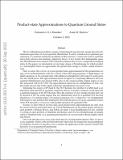Product-state approximations to quantum ground states
Author(s)
Brandao, Fernando G.S.L.; Harrow, Aram W.
DownloadHarrow_Product-state.pdf (791.5Kb)
OPEN_ACCESS_POLICY
Open Access Policy
Creative Commons Attribution-Noncommercial-Share Alike
Terms of use
Metadata
Show full item recordAbstract
The local Hamiltonian problem consists of estimating the ground-state energy (given by the minimum eigenvalue) of a local quantum Hamiltonian. It can be considered as a quantum generalization of constraint satisfaction problems (CSPs) and has a key role in quantum complexity theory, being the first and most natural QMA-complete problem known. An interesting regime for the local Hamiltonian problem is that of extensive error, where one is interested in estimating the mean ground-state energy to constant accuracy. The problem is NP-hard by the PCP theorem, but whether it is QMA-hard is an important open question in quantum complexity theory. A positive solution would represent a quantum analogue of the PCP theorem. A key feature that distinguishes quantum Hamiltonians from classical CSPs is that the solutions may involve complicated entangled states. In this paper, we demonstrate several large classes of Hamiltonians for which product (i.e. unentangled) states can approximate the ground state energy to within a small extensive error.
First, we show the mere existence of a good product-state approximation for the ground-state energy of 2-local Hamiltonians with one of more of the following properties: (1) super-constant degree, (2) small expansion, or (3) a ground state with sublinear entanglement with respect to some partition into small pieces. The approximation based on degree is a new and surprising difference between quantum Hamiltonians and classical CSPs, since in the classical setting, higher degree is usually associated with harder CSPs. The approximation based on expansion is not new, but the approximation based on low entanglement was previously known only in the regime where the entanglement was close to zero. Since the existence of a low-energy product state can be checked in NP, this implies that any Hamiltonian used for a quantum PCP theorem should have: (1) constant degree, (2) constant expansion, (3) a ``volume law'' for entanglement with respect to any partition into small parts.
Second, we show that in several cases, good product-state approximations not only exist, but can be found in deterministic polynomial time: (1) 2-local Hamiltonians on any planar graph, solving an open problem of Bansal, Bravyi, and Terhal, (2) dense k-local Hamiltonians for any constant k, solving an open problem of Gharibian and Kempe, and (3) 2-local Hamiltonians on graphs with low threshold rank, via a quantum generalization of a recent result of Barak, Raghavendra and Steurer.
Our work involves two new tools which may be of independent interest. First, we prove a new quantum version of the de Finetti theorem which does not require the usual assumption of symmetry. Second, we describe a way to analyze the application of the Lasserre/Parrilo SDP hierarchy to local quantum Hamiltonians.
Date issued
2013-06Department
Massachusetts Institute of Technology. Department of PhysicsJournal
Proceedings of the 45th annual ACM symposium on Symposium on theory of computing (STOC '13)
Publisher
Association for Computing Machinery (ACM)
Citation
Fernando G.S.L. Brandao and Aram W. Harrow. 2013. Product-state approximations to quantum ground states. In Proceedings of the forty-fifth annual ACM symposium on Theory of computing (STOC '13). ACM, New York, NY, USA, 871-880.
Version: Original manuscript
ISBN
9781450320290